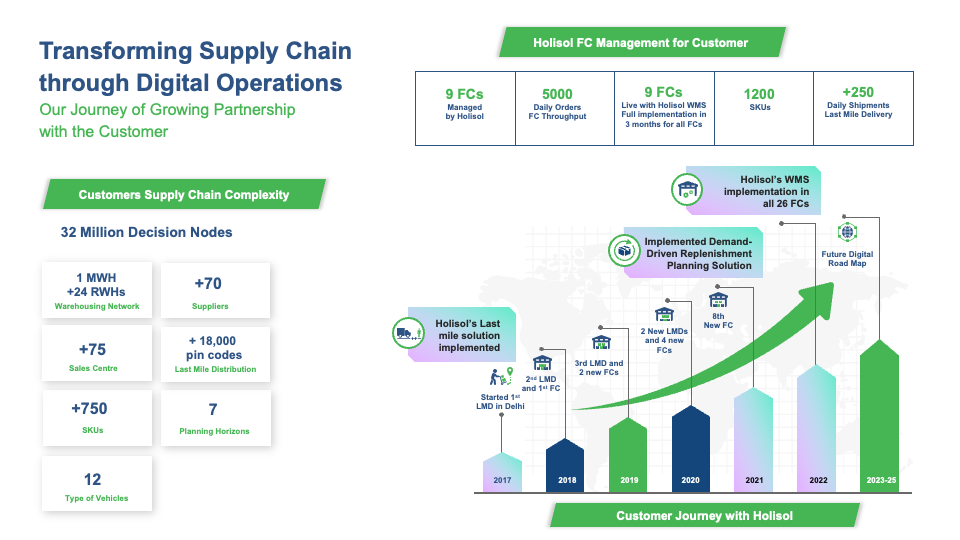Introduction
Smart dispatch planning is the cornerstone to establishing the brand value of an organization and building customer trust. Supply chains rely on a robust dispatch strategy to fulfil customer expectations and meet sales targets in full and on time, while staying prepared against all potential disruptions to the demand or production cycle arising due to inclement events of the external environment. This is necessary, for a poorly drafted dispatch plan can bring extensive damages for a supply chain in terms of excessive expenditures, damaged goods, and delays in order delivery. Corporations, therefore, see an immense incentive in optimizing their dispatch planning process.
The following case study will investigate the conceptual design and planning strategy of the Dispatch Allocation Planning (DAP) module of Verdis. It will share its deployment at an auto MNC major and how its delivery of a plan that optimizes dispatch allocation and vehicle loading, helped the company extract the maximum value from the available resources of the dispatch environment.
The Study
The dispatch scenario was studied in detail for the auto MNC, which is a major player in the Indian automobile market. This company has an elaborate supply chain with multiple plants situated at different locations in a region, manufacturing a total of 25 models of scooters and motorbikes, of multiple colour variants, and BS-types. The market base is extensive, catering products to a network of over a thousand dealers nationally.
The environment of dispatch for this auto company spans complex interlinkages between the sales requirements, production output, pre-dispatch processes, and distribution. Yet, the dispatch allocation planning must occur such that the sales requirement is met in full and on time, with the added critical requirement of freight cost minimization, within the accepted boundaries, constraints, and complexities of the dispatch environment.
Complexity of the Planning Process
The complexities of the production, dispatch processes, and sales environment feeds into the dispatch planning process.
- Multiple plants may service multiple dealers in a region separated by differing distances. Often, the orders for a product type and variant are not available at the plant closest to the dealers. This makes the fulfilment of complex orders difficult.
- Order changes due to changes in the market requirement or due to restrictions of availability can occur in an unprecedented way. Such changes often lead to unwanted delays in delivery, while accruing additional warehousing and inventory-maintenance charges.
- A dealer’s requirement may be less than an optimal or full load. In such cases, dispatches may be made at additional costs to the company or dealers may be serviced in a different cycle. Neither of these scenarios are desirable for a corporation.
Limitations of the Dispatch Environment
To add to the complexity, the dispatch environment is bound within its own physical limitations of the working environment. This includes-
- In a single load, exactly 40 vehicles need to be transported for cost optimization and for fully utilizing the size and tonnage limits of the vehicle. Further, scooters and motorcycles in a load can be placed in multiples of 4 only, to reduce chances of damage. If a vehicle’s load capacity is underutilized, it can lead to a greater number of dispatches for the same number of orders and, therefore, create greater transportation charges and chances of damages.
- Stock dispatch should occur evenly across days to ensure the effective management of stock release and payment clearance.
- Certain limitations exist in the pre-dispatch process. Load clearance can only occur after the payment clearance process has occurred. However, dispatch planning, which occurs prior to the actual dispatch, is performed on the assumption that payment clearance would occur before the due date. Scenarios such as payment delays, payment failure, order revisions and cancellations, are frequent, resulting in dispatches for such orders being halted. Therefore, the dispatch planning should be flexible enough to assimilate all such unprecedented changes.
The Verdis Solution
Verdis recognizes the importance of a strategy that would, on implementation, create the correct product flow to the right place at the right time, inspite of sudden changes in demand. To reach such a solution, a virtual environment of dispatch was created to mimic the real-world dispatch scenario as it existed on the ground. This involved the consolidation of all dynamic data points, including the sales requirement, the production plan, the opening stock, and the days of production for each plant.
Within this environment, the DAP module of Verdis performed an analysis of the N-dimensional data space to find solutions or dispatch allocation plans that adhered to the boundaries and constraints of the dispatch environment. It, then, mapped the solution space, composed of 90 million possible solution points to find the most optimal solution that was cost effective and could fulfil the sales requirement with the least degree of variance in terms of delivery in full and on time.
The final solution or the final dispatch allocation plan (DAP) proposed by
- Dispatch schedules were planned commensurate with order cycles and payment clearance.
- Product load mix solutions such as club loading were adopted for sub-optimal product quantities.
- Planning time was significantly lowered to generate higher productivity for all involved.
- The dispatches were minimised to the extent possible without affecting Sales order fulfilment
- Lesser number of dispatches ensured lower fuel utilization and, therefore, lower environmental footprint.
Benefits of Verdis DAP
The deployment of the Verdis proposed solution in the actual dispatch environment of the auto company over one dispatch cycle showed remarkable results.
- Cost savings in the dispatch cost amounted to 16.5% per unit on selection of the optimised solution proposed by Verdis.
- Reduction in time taken to prepare DAP was to the extent of 67%. With reduced time for DAP and 100% error free planning, senior team members could utilise their time in more productive areas.
Therefore, Verdis not only provided a smarter approach to dispatch planning, but also added benefits that far exceeded the possibilities of optimization possible through manual or conventional dispatch planning methodologies.
Next Generation DAP
The next generation DAP module of Verdis will combine the full spectrum of its predictive and prescriptive competencies, creating room for greater operational advantages.
These competencies can be understood in terms of intelligent Insights delivered through an integration of the local and global environment.
- Weather Events Impact. On integration of its meteorological data repositories with the DAP environment, Verdis will be able to detect weather phenomenon that can affect dispatch processes, estimate the impact of weather events on lead times, and prescribe alternative routes or backup plans.
- Forecasting of lead time. Lead times can be dynamic for different geographies, climatic conditions, or poor road infrastructures. With lead time forecasting, the most optimal routes will be chosen based on lead time dependencies, and scenarios leading to delays in order fulfilment will be avoided where possible.
- Payment Forecasting. With payment forecasting, the uncertainties of the pre-dispatch environment will be minimized, with little cause for repeated iterations of the dispatch planning process.
- Geography-based sales forecasting. The demand for particular models are different for different Integrating Verdis’ demographic and geographic data repositories with the DAP environment will lend greater predictability of sales – a factor that will feed into dispatch planning.
- Forecast of disruptive events. Through analysis of historical events and periodic demand-supply tendencies, Verdis can predict potential disruptive events, therefore enabling guided and more efficient dispatch planning.
With Verdis’ AI-driven learning models and next-generation analytical capabilities, Verdis can, thus, ensure greater robustness and responsiveness to internal and external disruptions.
Verdis 2.0 – A Step towards a More Responsive Supply Chain
The operational modules of Verdis, including DAP, exist within a consolidated AI framework with competencies that encompass not only the requirements of greater responsiveness or decreased costs in Supply Chain operations but also a philosophy aimed at delivering organization excellence.
Verdis drives
- Focused and contextual understanding of supply chain processes End-to-end integration of the supply chain
- Removal of siloed organizational processes and department to an integrated and transparent framework
- Monitoring of external events through integration with external data repositories
- Intelligent Insights generation that identifies growth opportunities Adaptability to changes in the operating environment
- Flexibility to absorb likely disruptions through impact calculations Ease of collaboration and joint decision making
- Intelligent output generation in a variety of business-appropriate formats Understanding of your data needs with natural language processing
Verdis intelligence through the use of AI/ML technology is growing into greater realms of Supply Chain efficiency. By venturing into all operations of the Supply chain, including sourcing, procurement, supply, distribution, inbound and outbound logistics, spend analytics, forecasting, etc. Verdis is fulfilling the requirements of a global and modern supply chain.
Holisol Logistics Private Limited
Holisol is a leading supply chain organization providing “Tech enabled End-to-End supply chain solutions” for customer’s business. Holisol works on the value proposition of Design-Implement-Manage E2E logistics to offer customers an experience of working like their own extended team, with affordable strategic and operational expertise.
Headquartered in Delhi, Holisol has a workforce of +250 supply chain enthusiasts who are continuously building value through leadership, innovation and relationships.
Holisol’s strategic partnership with Cogneau Systems, an AI product venture, has enabled its Supply Chain expertise to be combined with the power of Artificial Intelligence, Big Data and Data Science. Their combination has made Verdis a powerful source of intelligence for solving Supply Chain problems.
For more information please write to us at – [email protected].




